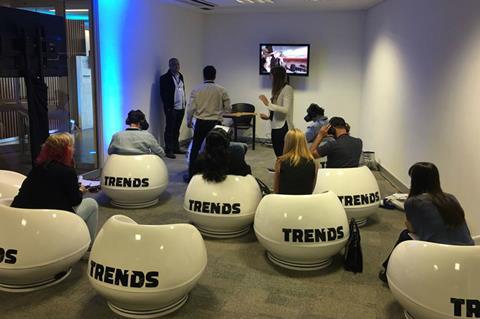
The TRENDS immersive content showcase concluded at the Ventana Sur market in Buenos Aires recently with defiant calls by Latin American creators for greater collaboration and heard preliminary results from a survey of Iberoamerican companies.
Argentina’s Untref University conducted a study of more than 50 Iberoamerican companies and will publish results in March 2018. Preliminary findings outlined by the university’s Ignacio Dimattia indicated that 83% of respondents were private companies, 13% public, and four percent mixed.
Dimattia noted the companies – the bulk of which come from Argentina, followed by Brazil, Colombia and Mexico – were mostly small with one to 10 employees. Only 5% of respondents employed more than 50 people. Some 59% hired an equal number of male and female employees, while 41% reported a staff of 60-80% male employees.
Some 88% of content made by these companies is categorised as VR, while 69% is AR (augmented reality), 66% is 360 video, 58% is MR (mixed reality), 22% falls under dome-based video projection environments. In terms of applications, 77% is for games and education, 36% for medical purposes, and 22% for scientific projects.
The university is working with immersive content creators in Spain to populate a larger study. Dimattia said the hope was to create a network of Latin American universities, and he had already received interest from The Catholic University Of Chile.
Speaking on a panel immediately after the presentation, creators stressed the importance of strength in numbers. “It’s very important that Latin America sticks together,” Damián Turkieh of Argentinian company Realidad 360 said. “Together we are strong. Immersive content is new so it’s a big opportunity for everyone.”
José Campusano from Argentina’s Cinebruto, which has used 360 technology on a project about police corruption in Buenos Aires, reinforced the message. “We have to interact at events like this, set up co-productions and exchange information.”
Nicolás Alcalá, a content creator from Spain’s Future Lighthouse Films, said: “For 100 years cinema was one format but things have cropped up in different formats. We must evolve what we understand as a film or a video game.
“We’re heading towards narratives that are highly influenced by AI,” Alcalá continued. “This is opening up possibilities and also in how we relate to the author… The more we share the better. There is no competition [between us]. The market has to move forward.”
“We’re Latin America. We don’t have to ask for permission so let’s do it,” Leonardo Medel from Chile’s Constitucion Films, who has made a VR feature and an AR feature, said.
Paraguay’s Michael Novick Jr. from Al Mango has been working in the field for two years and developed a VR series called Opus. He said it was difficult to monetise content, a common refrain heard on VR and immersive content panels around the world. “But there are stories out there and they’re going to be told.”
TRENDS concluded its second year at Ventana Sur. “After a good reception we realised we could become like the home for this [sector],” organiser Gabriel Grandinoto said. “Next year we will launch a contest to take one Argentinian game developer to Texas [SXSW] and they will also go to San Francisco.”

























No comments yet